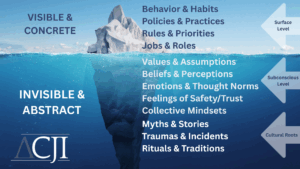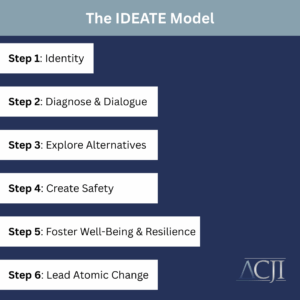The One Thing You Need to Know About Culture Change
- What culture really is
- Why it matters
- How to shift it
- Where you can learn more
Culture change is always happening. The question is, are you shaping it by design or letting it drift by default?
Healthy cultures don’t just happen. They are intentionally designed, modeled, and reinforced.
How Culture Shows Up in Criminal Justice
Culture in criminal justice organizations tends to be:
- Hierarchical – Decisions flow from the top down
- Complex – Many rules and processes
- Siloed – Divisions and units operate in isolation
- Risk-averse – Fear of failure or liability stifles innovation
If you’ve worked in probation, corrections, law enforcement, or behavioral health, this probably sounds familiar. Similar patterns show up across human services, too.
The problem? These cultural habits can undermine reform. Leaders roll out new initiatives, but if staff don’t feel safe, supported, or aligned, change stalls.

Why Culture Matters More Than Strategy
You’ve probably heard the phrase: “Culture eats strategy for breakfast.”
That’s not just a slogan. Culture is upstream from everything. Without the right culture:
- Programs feel like band-aids on deeper problems.
- Leaders try to fix adaptive problems with technical checklists.
- Staff become stuck in problem mode instead of imagining what’s possible.
- Leaders’ good intentions don’t match the impact staff actually feel.
Strategy without culture is like seeds planted in concrete. Nothing grows.
How Do You Actually Change Culture?
Culture change isn’t a memo. It’s not quick training or a compelling new mission and vision statement. It’s more like gardening… slow, intentional, and ongoing.
At ACJI, we use the IDEATE Model, which is a structured, research-based cycle that helps leaders guide culture change step by step.

Step 1: Identify
Capture where your culture is now and where you want it to be. ACJI’s Culture Capture model that we employ with our clients makes the invisible visible.
Step 2: Diagnose and Dialogue
To go deeper, you next need to talk to stakeholders. Explore the habits, stories, and patterns shaping your current culture. Create space for staff and others affected by culture to name what’s working and what’s not.
Step 3: Explore Alternatives
Instead of obsessing about what’s broken, use Appreciative Inquiry to ask:
- When are we at our best?
- How can we build more of that?
Step 4: Create Safety
Nothing changes if people don’t feel safe. Leaders must build psychological safety, which means staff will know they can speak up without fear.
Step 5: Foster Well-Being and Resilience
Change is exhausting. Leaders need tools to sustain energy and hope, both for themselves and their teams. Integrate well-being practices, trauma awareness, and resilience strategies into every step.
Step 6: Lead Atomic Change
Forget giant leaps. Lasting culture shifts come from small, steady moves. Focus on the 1% of improvements that, over time, transform everything.
Conclusion
Culture is the hidden force shaping everything in our organizations. In human services and criminal justice, where the stakes are high and the work is hard, culture can either fuel resilience and innovation or drag down even the best reforms.
If you’ve ever wondered how to make culture change real, the ACJI Culture Academy is your next step. Learn more on our website here.





